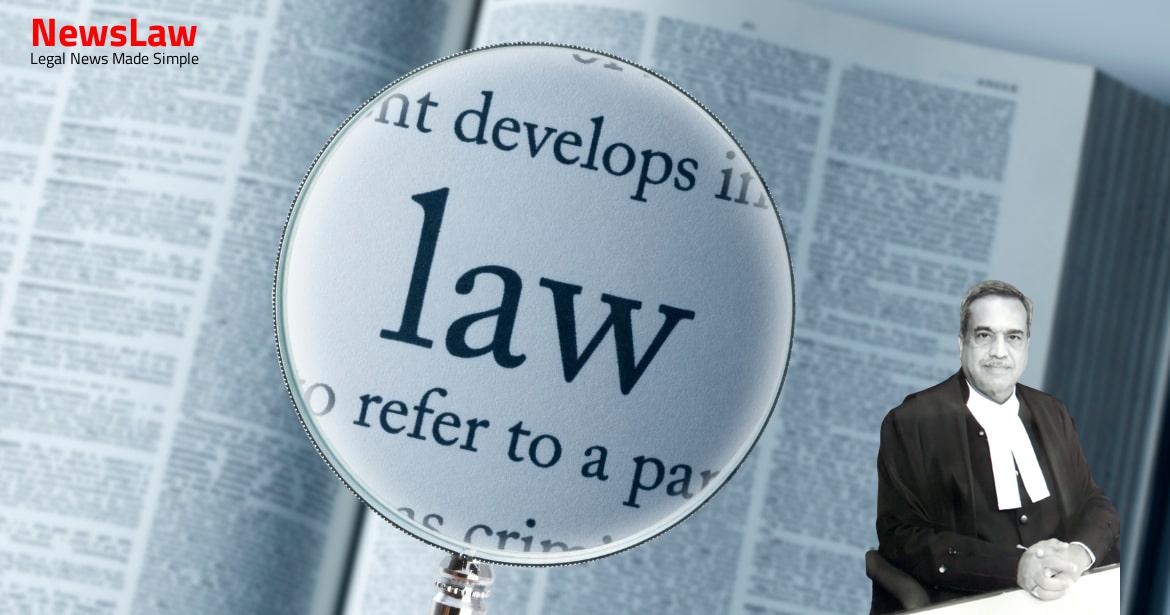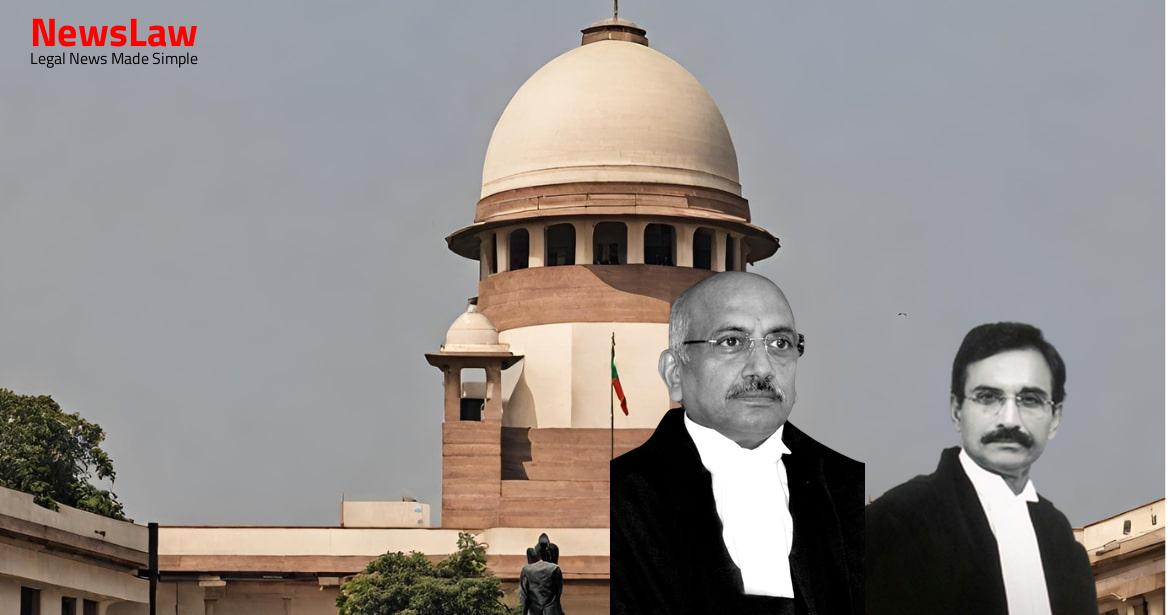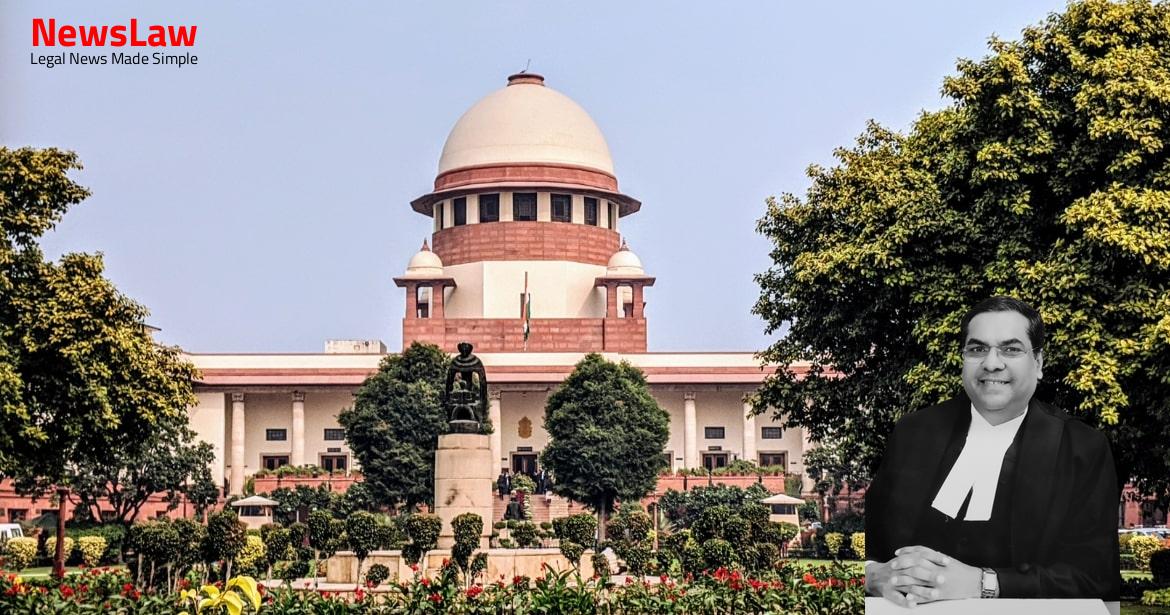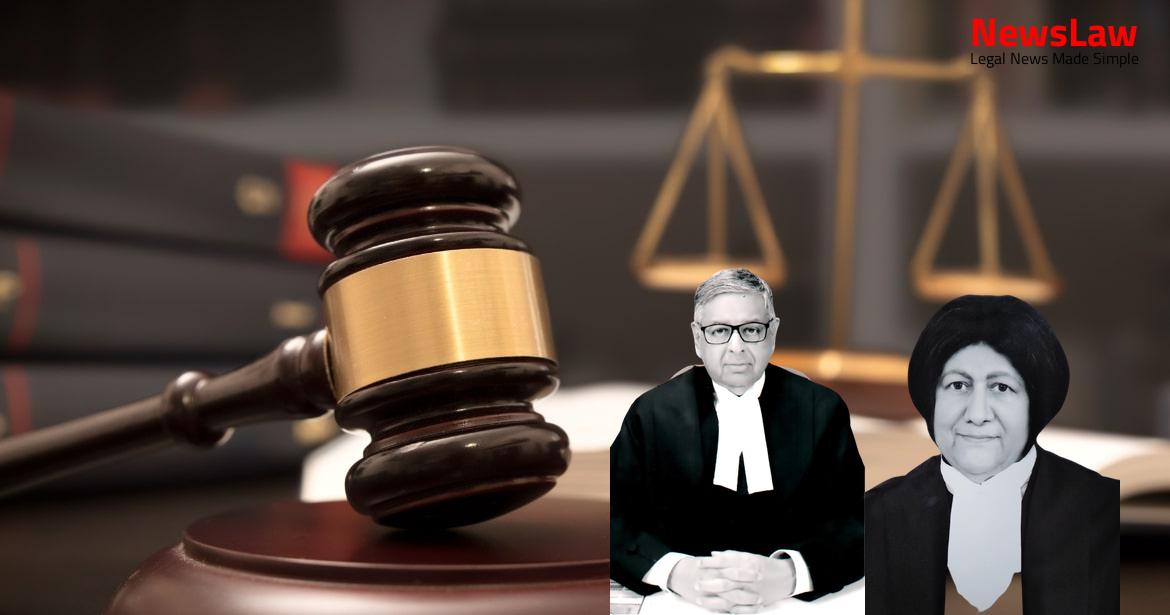The court’s legal analysis in a recent case involving the grant of bail has set a significant precedent. The judgment delves into the essential factors to be considered when deciding on bail, emphasizing the balance between public interest and individual liberty. The court’s scrutiny of relevant factors and its exercise of discretion in bail decisions are crucial aspects discussed. Stay informed about the intriguing legal insights unveiled in this case.
Facts
- The appellant, son of the deceased, is aggrieved by the High Court’s decision to release the accused on bail.
- The High Court granted bail to respondent no.1, the original accused, in connection with FIR No 245 dated 21.09.2020.
- The charges against the accused include Sections 302, 120-B, 34, 201 IPC, and Section 25 of Arms Act, 1959.
- The informant has appealed to quash the High Court’s decision and keep the accused in custody.
- The appellant lodged an FIR against the accused, including respondent no.1, for various offences including murder
- Accused Inderpreet Singh was alleged to have hatched a conspiracy to kill the appellant’s father while in jail
- Inderpreet Singh confessed to being in touch with co-accused through a mobile phone from jail
- The High Court suspended Inderpreet Singh’s sentence pending appeal, which was later canceled due to threats made by him
- Inderpreet Singh and co-accused challenged the bail cancellation but were unsuccessful
- Investigation revealed regular calls made from a mobile phone to plan the murder
- Inderpreet Singh used a mobile phone in jail which was provided by another inmate, leading to the murder conspiracy
- Chargesheet was filed against the accused for various serious offences
- Inderpreet Singh’s bail application was rejected by the Sessions Judge
- High Court granted bail to Inderpreet Singh citing lack of direct participation in the murder and time spent in custody
Also Read: Judicial Review of Delayed Writ Petition
Arguments
- The learned Counsel representing the appellant vehemently argues that the High Court made a grave error in granting bail to respondent no.1, emphasizing his habitual offending behavior.
- It is highlighted that respondent no.1 has been previously convicted in four other FIRs, indicating a pattern of criminal behavior.
- The Counsel asserts that the High Court failed to consider crucial evidence collected during the investigation, which suggests a conspiracy hatched by respondent no.1 from jail with other accused individuals.
- Concerns are raised regarding the potential misuse of bail by the accused, given his past conduct and the gravity of the offense.
- The failure of the High Court to assess the accused’s antecedents, motive behind the offense, and threat perceptions to the complainant and family members is emphasized.
- The Counsel argues that the accused’s previous convictions and misuse of bail in other cases demonstrate the likelihood of reoffending if released on bail.
- The specific details of the offense, including the alleged conspiracy and resulting fatal injuries to the deceased, are highlighted to underscore the seriousness of the case.
- Accused respondent no.1 is alleged to have used a mobile phone while in jail during the investigation.
- Accused respondent no.1 was in jail at the time of the incident in question and there is no direct evidence of his participation.
- Bail was granted to accused respondent no.1 by the High Court, and it can be cancelled if misuse is proven.
- Accused respondent no.1, along with others, has been chargesheeted for various offenses after investigation in FIR No. 245.
- There is a dispute regarding the possession of a mobile phone by accused respondent no.1 within the jail premises.
- Allegations of misuse of bail by accused respondent no.1 have not been substantiated post his release.
- Opposition to bail application from the Public Prosecutor and complainant’s counsel based on the accused being a habitual offender.
- Accused respondent no.1 allegedly hatched a conspiracy to commit murder while in jail.
Also Read: Ownership Dispute: Legal Analysis on Admission and Decree
Analysis
- Grant of bail should not be a matter of course and should be exercised judiciously with cogent reasons.
- Bail orders without reasons for granting bail are liable to be set aside for non-application of mind.
- Factors guiding the grant of bail include the nature of accusations, severity of punishment, prima facie evidence of guilt, and potential witness tampering or threat to the complainant.
- Frivolity in prosecution should be considered, and only genuine cases should be granted bail.
- The severity of the punishment, nature of the offence, and the gravity of the crime are crucial in bail decisions.
- Bail should be granted keeping the balance between public interest and individual liberty.
- The absence of awareness of the nature and gravity of the crime can affect the bail decision.
- The court should consider various factors like the likelihood of the accused absconding, influence on witnesses, and the danger of justice being thwarted when deciding on bail.
- Deprivation of liberty through refusal of bail serves the bifocal interests of justice without punitive purposes.
- Liberty is a controlled and restricted value in an organised society, and individual liberty cannot undermine law and order.
- High Court failed to consider the criminal history and threat perception posed by respondent no.1
- High Court erred in granting bail without considering relevant factors and facts of the case
- Court may set aside bail orders if granted without due application of mind
- Antecedents of respondent no.1 show a pattern of committing offences while on bail
- Court must balance factors and exercise discretion judiciously while granting bail
- Appellate court’s role in assessing bail order differs from cancellation of bail application
- Prima facie belief in accused’s guilt and ensuring justice process are crucial in bail decisions
- High Court’s failure to acknowledge accused’s ability to hatch conspiracies from jail is concerning
- Superior court can set aside bail if relevant factors are not considered or irrelevant factors are taken into account
- Determination of perverseness, illegality, or justification of bail order is a matter for trial
- Grant of bail must not thwart the course of justice or allow the accused to repeat offenses
- High Court’s reasoning for granting bail without discussing evidence in detail is not sustainable
- The High Court failed to notice material facts and did not apply due consideration to the seriousness of the crime and circumstances.
- The seriousness of the crime and circumstances should have been taken into consideration for the bail decision.
- Based on the facts and circumstances, along with previous legal precedents, the High Court’s decision to release the accused on bail was a grave error.
- The High Court’s judgment and order are unsustainable and have been quashed and set aside.
Also Read: Interpretation of Statutory Limitation under Section 263(2)
Decision
- Respondent no.1 – Inderpreet Singh directed to surrender immediately.
- In case of failure to surrender, arrest warrants to be issued against respondent no.1.
- Observations made in this decision are only for the purpose of granting bail to respondent no.1 and will not impact the trial of the case.
- Trial court to decide the case on its own merits in accordance with the law.
- The appeal is allowed, and bail granted to respondent no.1 is cancelled.
Case Title: HARJIT SINGH Vs. INDERPREET SINGH @ INDER (2021 INSC 418)
Case Number: Crl.A. No.-000883-000883 / 2021



